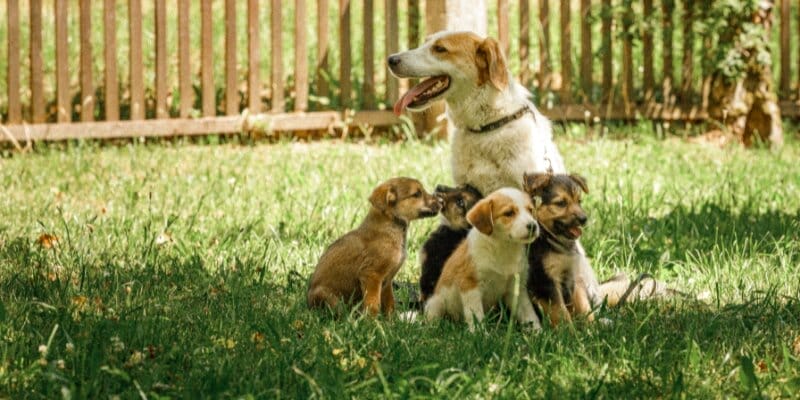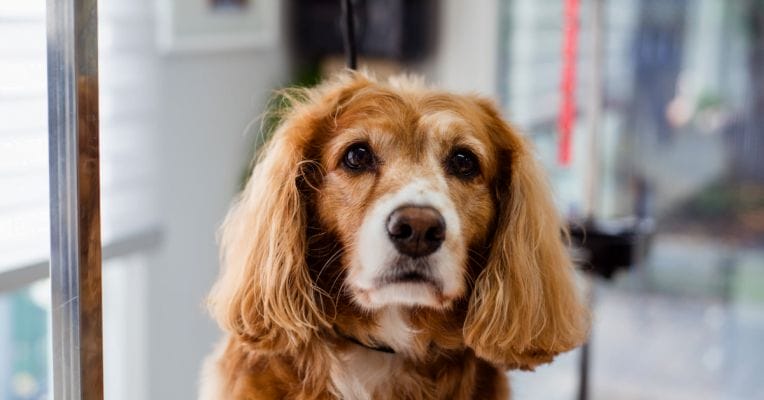Why is My Dog Not Eating After Giving Birth

Unraveling the Mystery – Why is My Dog Not Eating After Giving Birth?”
Dealing with the puzzling situation of “why is my dog not eating after giving birth” can be confusing for pet owners. It’s important to explore the potential reasons behind this behavior to ensure the health and well-being of your dog.
Your dog not eating after giving birth due to the stress of childbirth, hormonal changes, and the demands of motherhood. These factors can contribute to a temporary loss of appetite. If the lack of appetite persists, consulting with a veterinarian is advisable to rule out any underlying health concerns.
Being patient, observant, and taking timely action will contribute to ensuring a smooth postpartum recovery for your cherished canine companion, answering the perplexing question of “why is my dog not eating after giving birth.”
- Natural Postpartum Adjustment: The period following childbirth is a significant time for both humans and dogs alike. Just as new mothers might experience changes in appetite, dogs can also undergo a natural adjustment phase. The physical and hormonal shifts during this time may contribute to a temporary decrease in appetite. That’s why dog not eating after giving birth.
- Maternal Priorities: A mother dog’s priorities shift drastically after giving birth. The overwhelming maternal instinct kicks in, directing her focus towards caring for her newborns. This intense dedication to nurturing her puppies may cause her to momentarily neglect her own dietary needs.
- Hormonal Fluctuations: Hormones play a crucial role in a dog’s postpartum period. The fluctuations in estrogen and progesterone levels can impact her mood, energy levels, and, consequently, her appetite. These hormonal changes are part of the natural process and should normalize over time. That’s the reason dog not eating after giving birth.
- Physical Discomfort: The birthing process can take a toll on a dog’s body, leading to physical discomfort. Soreness, exhaustion, or minor injuries may contribute to her reluctance to eat. Providing a comfortable and quiet space for her to recover is essential during this period.
- Stress and Anxiety: Changes in the environment, the presence of strangers, or disruptions to her routine can induce stress and anxiety in a new mother dog. These emotional factors can directly influence her eating habits. Creating a calm and secure atmosphere can help alleviate stress and encourage her to eat.
- Weaning Process: As the weaning process begins, the mother dog’s nutritional needs undergo a shift. This transition may result in changes in appetite as she adjusts to a new feeding routine. Ensuring a balanced diet during this period is vital for her overall health.
- Dental Issues or Pain: Postpartum, some dogs may experience dental problems or pain, making it uncomfortable for them to eat. Regular dental check-ups and providing easily chewable food can address this concern and promote a healthy appetite.
- Medical Conditions: While a temporary loss of appetite is common after giving birth, persistent refusal to eat could signal an underlying medical issue. Consulting with a veterinarian is crucial if the lack of appetite persists, ensuring prompt identification and resolution of any health concerns.
- Encouraging Appetite: To entice your dog to eat, offering small, nutritious meals at regular intervals can be beneficial. Warming the food or adding a bit of low-sodium broth may make it more appealing. Gradually reintroducing her to her regular diet is also a prudent approach.
- Professional Veterinary Guidance: If your dog’s refusal to eat continues, seeking professional veterinary advice is paramount. A thorough examination by a veterinarian can help rule out potential health issues and provide the necessary guidance to ensure your dog well-being.
What to Do if My Dog Will Not Eat After Giving Birth?
Navigating Postpartum Concerns: ” What to Do if My Dog Will Not Eat After Giving Birth?”
We’ll explore the various steps you can take if you find yourself wondering, “What to do if my dog will not eat after giving birth?”
- Observe Behavior and Monitor Puppies: Start by closely observing your dog’s behavior. If she’s attentive to her puppies, alert, and responsive, it may be a natural phase of postpartum adjustment. Ensure the puppies are nursing well and gaining weight, as their health is directly linked to the mother’s well-being.
- Create a Quiet and Comfortable Environment: Provide a calm and comfortable space for your dog to rest and recover. Minimize disruptions, keep noise levels low, and make sure she has a cozy spot to relax with her puppies. A stress-free environment can positively impact her appetite.
- Offer Tempting and Nutritious Food: Experiment with different types of food to find something tempting for your dog. Warm the food slightly or add a bit of low-sodium broth to enhance its aroma. High-quality, nutritious meals can entice her to eat and provide the essential nutrients she needs during this period.
- Small, Frequent Meals: Instead of large meals, offer smaller, more frequent portions throughout the day. This can be especially helpful if your dog is experiencing discomfort or has a reduced appetite. The goal is to ensure she receives an adequate intake of calories and nutrients.
- Stay Hydrated: Encourage your dog to stay hydrated by providing fresh water at all times. Dehydration can exacerbate the loss of appetite and hinder the recovery process. Ensure her water bowl is easily accessible, and monitor her water intake.
- Consult with Your Veterinarian: If your dog’s refusal to eat persists, it’s crucial to consult with your veterinarian. A professional examination can help rule out any underlying health issues that may be contributing to her diminished appetite. Your vet can provide tailored advice based on your dog’s specific needs.
- Consider Wet or Soft Food Options: Soft or wet food options can be more palatable, especially if your dog is experiencing dental discomfort. These options are easier to chew and may be more appealing during this postpartum phase.
- Gradual Transition to Regular Diet: If your dog has been on a specific diet, consider gradually transitioning her back to her regular food. Abrupt changes can be unsettling, so make the shift slowly, allowing her digestive system to adjust.
- Ensure Emotional Well-being: Emotional well-being is just as crucial as physical health. Spend quality time with your dog, providing reassurance and affection. Positive interactions can alleviate stress and anxiety, contributing to a more relaxed and comfortable state.
- Be Patient and Persistent: Patience is key during this period. Understand that a temporary loss of appetite is a common occurrence after giving birth. Be persistent in your efforts to encourage eating, but also recognize that it may take some time for your dog to fully regain her normal eating habits.
How to Get My Dog to Eat After Giving Birth?
Creating a calm and comfortable environment is crucial provide a quiet space where she can nurse her puppies without disruptions. Experiment with different types of food.
- Warming it slightly or adding appealing flavors to entice her palate.
- Offering small, frequent meals rather than large portions can make the eating experience less overwhelming.
- Stay diligent about keeping fresh water accessible to ensure proper hydration.
If her reluctance to eat persists, consult with your veterinarian for professional guidance. They can assess any underlying health issues and provide tailored advice to help your dog regain her appetite. Be patient, shower her with affection, and create a positive atmosphere your loving attention can go a long way in supporting her during this postpartum period.

Is it normal for a dog not to eat after giving birth
It’s pretty common for a dog not to eat after giving birth. This temporary lack of appetite is generally seen as a normal part of the postpartum phase for dogs. The combination of the birthing process, hormonal shifts, and the responsibilities of tending to newborn puppies can result in a decrease in a mother dog’s interest in food. Similar to human mothers, canine mothers often prioritize the welfare of their offspring over their own nutritional needs in the immediate postpartum period.
If you’re wondering, “why is my dog not eating after giving birth,” it’s likely due to these factors. However, if this lack of appetite persists, seeking advice from a veterinarian is recommended to ensure there are no underlying health issues.
What to feed mother dog after giving birth
After giving birth, it’s essential to provide a nutritious and well-balanced diet for a mother dog after giving birth to support her recovery and milk production. Opt for high-quality commercial dog food that is specifically formulated for nursing mothers, as it contains the essential nutrients needed during this critical period. Look for options that include a balance of proteins, fats, and carbohydrates.
Some dog owners choose to supplement their mother dog after giving birth diet cooked eggs, lean meats, or plain yogurt to enhance protein intake. Additionally, ensure access to fresh water at all times to support hydration. It’s advisable to consult with your veterinarian to determine the most suitable feeding plan based on your dog’s individual needs and any specific recommendations for her postpartum health.
Vitamins for dog after giving birth
Vitamin supplementation can aid in replenishing nutrients lost during pregnancy and lactation. Vitamin D is essential for calcium absorption, vital for bone health, while vitamin E supports the immune system. B-complex vitamins are valuable for energy metabolism, and vitamin K helps with blood clotting. Omega-3 fatty acids, often found in fish oil supplements, contribute to healthy skin and coat.
Consult with your veterinarian to determine the appropriate vitamin regimen for your dog, considering her individual needs and the specific requirements of her postpartum phase. While vitamins are beneficial, they should complement a well-balanced diet, so focus on providing nutrient-rich meals to support her recovery and the nurturing of her precious puppies.
Conclusion
In conclusion, navigating the perplexing question of “why is my dog not eating after giving birth” requires a thoughtful and understanding approach from pet owners. Recognizing the various factors contributing to this behavior, such as the stress of childbirth, hormonal fluctuations, and the demands of motherhood, is crucial for ensuring the well-being of our dogs. Providing a calm environment and offering nutrient rich, palatable food are initial steps in supporting a smooth postpartum recovery.
However, persistent loss of appetite warrants prompt attention, prompting a consultation with a veterinarian to rule out any underlying health concerns. By exercising patience, keen observation, and timely intervention, pet owners can play a vital role in helping their canine friends overcome postpartum challenges and thrive in their new roles as mothers.
FAQs – Why Is My Dog Not Eating After Giving Birth?
Is it normal for a dog not to eat after giving birth
It is relatively normal for a dog to experience a temporary loss of appetite after giving birth. The physical and hormonal changes, coupled with the stress of childbirth, can contribute to this behavior.
How long does it take for a dog to eat after giving birth?
The duration varies among individual dogs. Some may resume eating within a day or two, while others might take a bit longer. If the lack of appetite persists beyond a few days, it’s advisable to consult with a veterinarian.
How do I get my dog to eat after having puppies?
To encourage your dog to eat, provide a calm environment, offer easily accessible and nutrient-rich food, and consider warming her meals. If necessary, consult your vet for advice on palatable options or supplements.
What are bad signs after a dog gives birth?
Signs such as prolonged lack of appetite, lethargy, abnormal discharge, or signs of pain could indicate underlying issues. If you observe any concerning symptoms, seek immediate veterinary attention.
What is normal behavior for a dog after giving birth?
Normal postpartum behavior includes attentive care for the puppies, rest, and occasional trips outside for bathroom breaks. However, any extreme deviation from typical behavior should be monitored closely.
What is the best food for a dog after giving birth?
A balanced and nutrient-rich diet, possibly with supplements, can support your dog’s recovery. Consult your vet for recommendations tailored to your dog’s specific needs.
What is the best food for a nursing mother dog?
High-quality puppy food or specialized nursing formulas can provide the extra nutrients a mother dog needs during lactation. Consult with your veterinarian to determine the most suitable option for your dog’s health and the well-being of her puppies.
Why Is My Dog Not Eating After Giving Birth?
A dog may not be eating after giving birth due to temporary hormonal changes, stress from childbirth, and the demands of motherhood. It’s a common behavior, but if the lack of appetite persists, consulting a veterinarian is advisable to rule out any underlying health issues.






